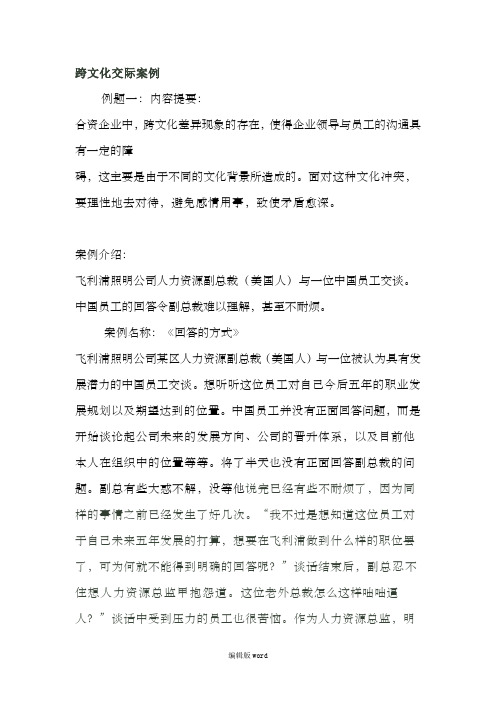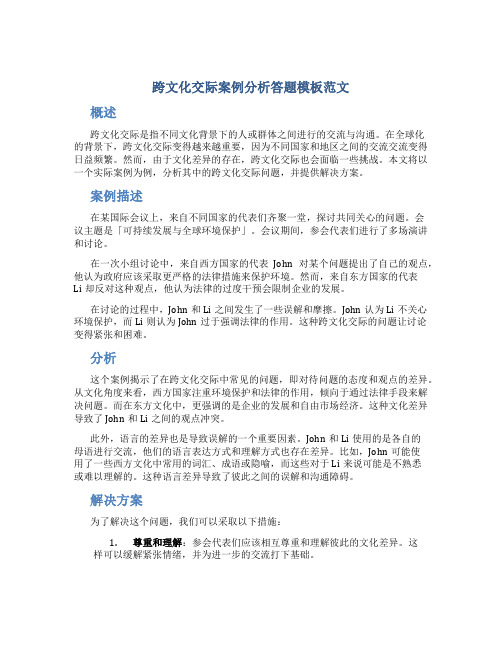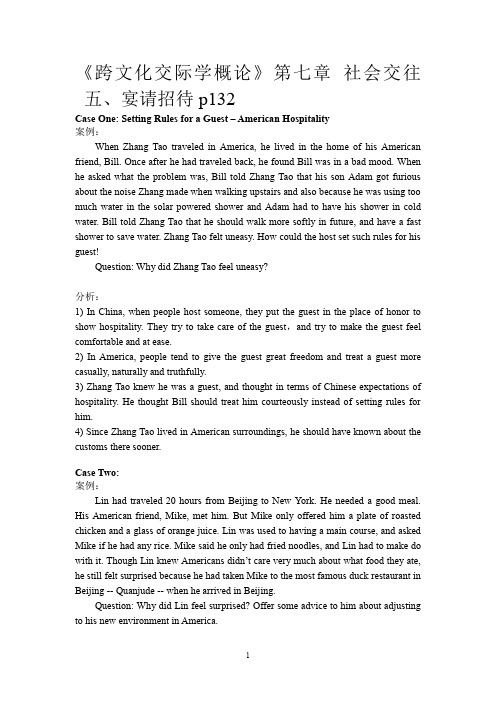(完整word版)跨文化交际案例分析
跨文化交流案例分析

跨文化交流案例分析跨文化交流是指不同文化间的交流和互动。
在当今全球化的背景下,跨文化交流变得越来越重要。
它不仅仅是两个国家之间的交流,也包括不同地区、不同民族、不同语言背景的人们之间的交流。
跨文化交流的成功与否,直接关系到个体和组织的发展和成长。
下面,我们将通过一个具体的案例来分析跨文化交流中可能出现的问题和解决方法。
在某公司的跨国合作项目中,来自中国和美国的团队成员需要共同合作完成一个项目。
由于双方文化背景和工作习惯的不同,团队合作过程中出现了一些问题。
首先,中国团队成员习惯于在会议上保持沉默,他们认为这样可以表现出谦虚和尊重。
而美国团队成员习惯于开放式讨论,提出自己的想法和建议。
这种文化差异导致了沟通不畅和信息不对称的问题。
其次,在工作分配和时间管理上也出现了一些问题。
中国团队成员更倾向于集体合作,他们习惯于共同商讨决策并分工合作。
而美国团队成员更注重个人责任和效率,他们更倾向于独立完成任务并按照个人计划工作。
这种差异导致了工作任务的分配不均和时间节点的延误。
针对以上问题,我们可以采取一些措施来促进跨文化交流的顺利进行。
首先,双方团队成员需要加强跨文化沟通的意识,了解对方的文化背景和工作习惯。
在沟通和会议上,可以采取轮流发言的方式,让每个人都有机会表达自己的看法和建议。
其次,在工作分配和时间管理上,可以采取折衷的方式,既考虑集体合作的优势,又兼顾个人责任和效率。
可以通过团队建设活动和培训课程来增进团队成员之间的了解和信任,提高团队的凝聚力和执行力。
通过以上措施的实施,中国和美国团队成员之间的跨文化交流逐渐得到了改善。
他们开始更加理解和尊重对方的文化差异,沟通更加顺畅,工作效率也得到了提升。
这个案例告诉我们,跨文化交流并不是一件容易的事情,需要双方的努力和理解。
只有通过增进了解、加强沟通,才能实现文化的融合和合作的成功。
在跨文化交流中,我们需要尊重和包容不同的文化,学会倾听和理解对方的观点,通过合作和共同努力,实现优势互补和共同发展。
跨文化交际案例分析最新版本

跨文化交际案例例题一:内容提要:合资企业中,跨文化差异现象的存在,使得企业领导与员工的沟通具有一定的障碍,这主要是由于不同的文化背景所造成的。
面对这种文化冲突,要理性地去对待,避免感情用事,致使矛盾愈深。
案例介绍:飞利浦照明公司人力资源副总裁(美国人)与一位中国员工交谈。
中国员工的回答令副总裁难以理解,甚至不耐烦。
案例名称:《回答的方式》飞利浦照明公司某区人力资源副总裁(美国人)与一位被认为具有发展潜力的中国员工交谈。
想听听这位员工对自己今后五年的职业发展规划以及期望达到的位置。
中国员工并没有正面回答问题,而是开始谈论起公司未来的发展方向、公司的晋升体系,以及目前他本人在组织中的位置等等。
将了半天也没有正面回答副总裁的问题。
副总有些大惑不解,没等他说完已经有些不耐烦了,因为同样的事情之前已经发生了好几次。
“我不过是想知道这位员工对于自己未来五年发展的打算,想要在飞利浦做到什么样的职位罢了,可为何就不能得到明确的回答呢?”谈话结束后,副总忍不住想人力资源总监甲抱怨道。
这位老外总裁怎么这样咄咄逼人?”谈话中受到压力的员工也很苦恼。
作为人力资源总监,明白双方之间不同的沟通方式引起了隔阂,虽然他极力想双方解释,但要完全消除已经产生的问题并不容易。
以上便是整个案例,这是一个很典型的跨文化焦急的例子。
首先,我们看到这位副总裁是美国籍人,而那位员工则是中国籍。
既然出生于两个不同的国度,那他们的思维方式、生活习惯、文化程度、教育程度、文化差异等众多方面都存在着差异。
正是由于这些文化差异的存在,才使得双方在交流、沟通过程中产生一系列障碍。
其次,“中国员工并没有正面回答问题”,我们可以想象一下这位中国员工没有正面回答问题的原因。
比如说由于语言障碍、没有理解透彻美国副总裁所说话语的原意;或者说副总的文化方式让中国员工产生了误解;亦或是中国员工有意回避从正面回答……。
以上原因都知识我们的推测而已。
下面我们给出一个假设。
跨文化交际案例分析题及答案

跨文化交际案例分析题及答案案例描述在跨国公司A的一个国际会议上,来自不同国家的员工们需要共同讨论一个重要项目。
会议进行了几天,但是却一直没有取得明确的进展。
不同国家的员工语言文化差异导致了沟通障碍,讨论过程中出现了许多误解和纠纷。
公司高层深感困惑,希望找到解决这个问题的方法。
障碍分析1. 语言障碍跨国公司A的员工来自不同的国家,他们使用的是各自母语进行交流。
除了英语是共同的工作语言外,其他国别的员工使用的语言差异较大。
这种语言差异导致了语言表达的不准确和理解的模糊,使得员工们无法正常交流和理解对方。
2. 文化差异不同国家的员工具有不同的文化背景和价值观念,这导致了他们在讨论过程中产生了误解和冲突。
文化差异可以涉及到对时间观念、权力关系、政治正确性和个人自由等方面的不同理解,这些差异会影响到他们的决策方式和工作方式,导致合作的困难。
解决方案1. 提供语言支持和培训跨文化交际的第一个挑战是语言障碍。
为了解决这个问题,公司可以提供语言支持和培训,以帮助员工们提高英语或共同工作语言的能力。
这可通过组织语言培训课程,雇佣专业翻译人员或提供翻译工具等方式实现。
提供语言支持和培训可以降低语言障碍,提高员工之间的沟通效率。
2. 开展跨文化培训除了语言障碍外,文化差异也是讨论中的一个重要问题。
公司可以组织跨文化培训,帮助员工了解不同文化之间的差异,并教授他们如何在跨文化环境中进行有效的沟通和合作。
该培训可以包括介绍不同文化的价值观、信念和行为准则,以及跨文化冲突解决的技巧和策略。
通过开展跨文化培训,可以提高员工对文化差异的认识和理解,促进跨文化交际的顺利进行。
3. 引入跨文化中介人为了解决跨文化交际中的难题,公司可以考虑引入跨文化中介人。
跨文化中介人是具有跨文化交际经验和能力的人员,他们可以在员工之间进行翻译和解释,协助双方理解并解决可能出现的误解和冲突。
跨文化中介人的介入可以减少员工之间的摩擦,促进合作和理解。
跨文化交际案例分析答题模板范文

跨文化交际案例分析答题模板范文概述跨文化交际是指不同文化背景下的人或群体之间进行的交流与沟通。
在全球化的背景下,跨文化交际变得越来越重要,因为不同国家和地区之间的交流交流变得日益频繁。
然而,由于文化差异的存在,跨文化交际也会面临一些挑战。
本文将以一个实际案例为例,分析其中的跨文化交际问题,并提供解决方案。
案例描述在某国际会议上,来自不同国家的代表们齐聚一堂,探讨共同关心的问题。
会议主题是「可持续发展与全球环境保护」。
会议期间,参会代表们进行了多场演讲和讨论。
在一次小组讨论中,来自西方国家的代表John对某个问题提出了自己的观点,他认为政府应该采取更严格的法律措施来保护环境。
然而,来自东方国家的代表Li却反对这种观点,他认为法律的过度干预会限制企业的发展。
在讨论的过程中,John和Li之间发生了一些误解和摩擦。
John认为Li不关心环境保护,而Li则认为John过于强调法律的作用。
这种跨文化交际的问题让讨论变得紧张和困难。
分析这个案例揭示了在跨文化交际中常见的问题,即对待问题的态度和观点的差异。
从文化角度来看,西方国家注重环境保护和法律的作用,倾向于通过法律手段来解决问题。
而在东方文化中,更强调的是企业的发展和自由市场经济。
这种文化差异导致了John和Li之间的观点冲突。
此外,语言的差异也是导致误解的一个重要因素。
John和Li使用的是各自的母语进行交流,他们的语言表达方式和理解方式也存在差异。
比如,John可能使用了一些西方文化中常用的词汇、成语或隐喻,而这些对于Li来说可能是不熟悉或难以理解的。
这种语言差异导致了彼此之间的误解和沟通障碍。
解决方案为了解决这个问题,我们可以采取以下措施:1.尊重和理解:参会代表们应该相互尊重和理解彼此的文化差异。
这样可以缓解紧张情绪,并为进一步的交流打下基础。
2.注意语言表达:参会代表们应该尽量使用简单、清晰、易懂的语言进行表达。
避免使用过于专业化或地方化的词汇,以免引起误解。
(完整word版)跨文化交际案例分析(共7个)

《跨文化交际学概论》第七章社会交往五、宴请招待p132Case One: Setting Rules for a Guest – American Hospitality案例:When Zhang Tao traveled in America, he lived in the home of his American friend, Bill. Once after he had traveled back, he found Bill was in a bad mood. When he asked what the problem was, Bill told Zhang Tao that his son Adam got furious about the noise Zhang made when walking upstairs and also because he was using too much water in the solar powered shower and Adam had to have his shower in cold water. Bill told Zhang Tao that he should walk more softly in future, and have a fast shower to save water. Zhang Tao felt uneasy. How could the host set such rules for his guest!Question: Why did Zhang Tao feel uneasy?分析:1) In China, when people host someone, they put the guest in the place of honor to show hospitality. They try to take care of the guest,and try to make the guest feel comfortable and at ease.2) In America, people tend to give the guest great freedom and treat a guest more casually, naturally and truthfully.3) Zhang Tao knew he was a guest, and thought in terms of Chinese expectations of hospitality. He thought Bill should treat him courteously instead of setting rules for him.4) Since Zhang Tao lived in American surroundings, he should have known about the customs there sooner.Case Two:案例:Lin had traveled 20 hours from Beijing to New York. He needed a good meal. His American friend, Mike, met him. But Mike only offered him a plate of roasted chicken and a glass of orange juice. Lin was used to having a main course, and asked Mike if he had any rice. Mike said he only had fried noodles, and Lin had to make do with it. Though Lin knew Americans didn’t care very much about what food they ate, he still felt surprised because he had taken Mike to the most famous duck restaurant in Beijing -- Quanjude -- when he arrived in Beijing.Question: Why did Lin feel surprised? Offer some advice to him about adjusting to his new environment in America.分析:1) 0n the topic of hospitality, the Chinese stress on warmth and demonstrating friendship. They take the guest to a famous or luxurious restaurant to have a very good (expensive) meal to show their hospitality. And the Chinese are used to having a big meal. The more dishes they put out,the greater the warmth and friendship they show.2) In western countries, people stress on freedom. They give the guest great freedom to choose their own foods. And westerners tend to have only one main course and some juice or dessert,which is viewed as casual in the eyes of the Chinese.3) Lin lived in American surroundings and should have adjusted himself quickly to the new world (lifestyle). He should have known the custom there first, and felt more at ease in Mike’s h ome.Case Three: Equality or Hospitality for Table Manners案例:Lin Hua has accompanied an American delegation to visit China. They have experienced the hospitality of the Chinese people. After returning to America, Linhua once visited them. They were so glad to meet again. Linhua offered to host the meal, but they refused. They ordered their own dish, and Linhua ordered her own. When footing the bill, they only paid their part,and no one wanted to pay for Linhua. Linhua found them so inhospitable, though she knew the Americans would usually pay for their own food.Question: Why did Linhua find them inhospitable?分析:1) In China, to show hospitality, people tend to host the meal. And if they cannot do this, they at least will struggle to pay for the guest.2) In America, people tend to pay for themselves to show equality and independence.3) Linhua knows this custom, but from a Chinese point of view, she still finds this hard to accept, and feels it a little inhospitable.Case Four:案例:I have an American friend. I have invited him several times, and at long last he invited me to his home one day. He told me to get there at 3 p m. I thought we could chat and have a meal together. I gave him a Chinese calendar, a woman’s scarf and a bottle of Chinese white wine. He only took out a dish of nuts, a plate of bread and a bottle of wine. After two hours’ chat, I found there was no hint of a meal and said good-bye to him. He only gave me a box of chocolate as a present for the New Year. After I got home, I found the box already been opened. I was very surprised, Question: What surprised me?分析:1) In China, a visit to home always includes a meal. And the guest always bringsa relatively expensive present to the host. And the present should be well wrapped or untouched.2) In the west, a visit to home only means a meeting, not necessarily including a meal. And the present is treated not as importantly as it is in China.3) I acted in a way that was based on Chinese customs, so I felt the American way was very interesting (unusual).Case Five: Way of Entertaining Guests in China ---- Drink more and more案例:Tom, an American, went to a Chinese home for the first time. He was offered some tea. Just when the first cup was about to finish, more tea was added. He drank the second cup. Then the cup was filled the third time. Then he drank it, then ⋯ until he was quite full. Tom was totally confused by the way of entertaining.Question: Why was Tom totally confused?分析:1) Traditional Chinese custom requires that during the course of entertaining, the host has to always pour more wine or tea to the guest’s glass or cup, and always adds more food to the guest’s plate or bowl without asking whether it’s wanted.2) Chinese guests know how to respond to this type of hospitality. They simply leave the wine, tea, or food in the container and stop having any more. But Tom, the American guest in the case didn’t know this.3) He followed the politeness rule of his culture: it’s not good manners to leave food in one’s own plate at a dinner table. Therefore, without any knowledge of the differences between the two cultures, an American guest would very likely suffer from either drinking or eating too much in such a situation.Case SixAs a foreign student at the University of Wisconsin in Madison, Keiko Ihara (Japanese) was on a strict budget. She had all her tuition and books paid for by scholarships and grants and until recently was comfortably housed in the dormitory. Wanting to live in the community rather than in the dormitory, she found a small apartment to share with a friend. Her college friends, knowing of her situation, offered to round up some of the necessary items for apartment living. Keiko politely declined, saying she could manage. Wanting to help out her friends found some old but still usable household appliances and furniture. Mary had an old desk that was in hergarage. Ed had some chairs from his uncle, and Joe and Marion had a few extra dishes. They cheerfully brought them over one day. Keiko seemed very embarrassed, but gracefully accepted them, sincerely and profusely thanked them.The following week they were each presented with a gift from Keiko. Mary got an ornate jewelry box, Ed a volume of woodcuts by a famous Japanese artist, and Joe and Marion a beautiful Japanese vase, all of which were of considerable worth and value, much more than the old things they had donated to her. They all protested that she could not afford to give such elaborate gifts; they really expected nothing as the household items were not really being used and they would rather have her use them. Keiko, however, insisted that they take the gifts. In the end, they accepted the gifts, although they all felt uncomfortable as they knew she was really sacrificing to give them.Questions:1. What do you think of Keiko insisting on giving valuable gifts to her college friends?2. Why did Keiko’s friends feel very uncomfortable when they received valuablegifts in return?分析:Keiko insists on giving valuable gifts to her college friends, because in countries like Japan, exchanging gifts is a strongly rooted social tradition. Should you receive a gift, and don’t have one to offer in return, you will probably create a crisis. If not as serious as a crisis, one who doesn’t offer a gift in return may be considered rude or impolite. Therefore, in Japan, gifts are a symbolic way to show appreciation, respect, gratitude and further relationship.Keiko obviously has taken those used items from Mary, Ed and Marion as gifts, for she probably doesn’t know that Americans frequently donate their used household items to church or to the community. Mary, Ed and Marion would never consider those used household items given to Keiko as gifts. No wonder they felt very uncomfortable when they received valuable gifts in return.Case SevenSelma, who is from the US, is in a student exchange program in Indonesia. One day, she was asked to attend a birthday party and she was delighted, for she was curious to know what an Indonesian birthday party was like. To her surprise, she was the only one that dressed in typically Western clothes. Although she had no strong reason to become uneasy, her uneasy feeling prevailed as the party was going on. To make herself feel better, she went to the food table and began to help herself. But, upon leaving the table, she tripped on the leg of a chair and spilled her drink on the floor. One of the girls stooped down to mop up the spill and everyone else laughed out loud. Selma, uncertain what to do next, quietly moved out of her way with her head lowered in shame.Questions:3. What functions does laughing serve in similar situations in China?4. What should we do to help ourselves or other people out of embarrassmentcaused by cultural differences in laughing?分析:Just like smile, laughing does not always serve the same function in different cultures. Interestingly, for us Chinese, laughing often has a special function on some tense social occasions. People may laugh to release the tension or embarrassment, to express their concern about you, their intention to put you at ease or to help you come out of the embarrassment. In this case, the people there were actually wishing to laugh with the American rather than laugh at her. Their laughing seemed to convey a number of messages: don‘t take it so seriously; laugh it off, it‘s nothing; such things can happen to any of us, etc. Unfortunately the American was unaware of this. She thought they were laughing at her, which made her feel more badly and angry, for in her culture laughing on such an occasion would be interpreted as an insulting response, humiliating and negative.。
【分析】跨文化交际案例分析

【关键字】分析从三个方面分析案例1.What cultural difference is reflected in this case?2.What behaviors of each party cause the clash?3.What might be done for each party to avoid the clash?例如:case 1 A Danish Woman in New York Step 1. 这个案例反应了实现有效跨文化交流的一个障碍:assuming similarity instead of difference(假定一致性)。
Step 2. In this case, the Danish woman assumes that her behavior of leaving the baby alone, which is common in Denmark, is also appropriate in New York.Step 3. To avoid misunderstanding, the Danish woman should learn more about American culture and adjust his behaviors accordingly. Case 2 中国女教师与外国女教师的冲突1. 这个案例反应了个人主义与集体主义的冲突Li Hong comes from a collectivist culture which emphasizes deference paid to people older than oneself and modestydisplayed on the part of the young. Maggy comes from an individualistic culture which values assertiveness and free expression of feelings.2.3.Case 3Susan Wood, a young American mother of a four-year-old boy, came to China for the first time. She wrote a letter to her parents for help. Dear Dad and Mom,I don’t feel happy in China. I am scared by how the Chinese treat Tommy. Tommy is already four years old. Whenever I take him outside, a lot of Chinese w hom I don’t know would fondle him, touching, patting, hugging or even kissing him. It seems that the Chinese are treating Tommy as a pet. I think they are very rude. What should I do?Best wishes,Susan1.This case reflects different attitudes towardsone stuff of people from different cultural backgrounds.此文档是由网络收集并进行重新排版整理.word可编辑版本!。
跨文化交际英语案例分析万能模板
跨文化交际英语案例分析万能模板引言在全球化的趋势下,跨文化交际已成为日常生活和工作中的常态。
无论是国际贸易、跨国合作还是旅游交流,我们都会面临与不同文化背景的人进行交流和沟通的挑战。
特别是在学习和使用英语的过程中,我们需要了解不同文化对于语言使用和交际方式的影响。
本文将通过分析具体的跨文化交际案例,探讨英语学习者在不同文化背景下的沟通策略和技巧。
案例一:商务洽谈中的礼节差异A公司是一家美国跨国公司,打算与中国的B公司展开商务合作。
双方代表进行了一次面对面的商务洽谈。
在会议中,中国代表以客人的身份招待美国代表,并为其安排了一顿丰盛的中餐。
然而,美国代表主动将自己的商业计划一一介绍后,提出了一些具体的问题和要求。
此时,中国代表显然有些紧张和不悦,并没有直接回答问题,而是转移了话题,讲述了一些与商务无关的事情。
这种回应方式在美国文化中被视为不专业和不直接,可能会影响双方的合作关系。
在这个案例中,我们可以看出美国和中国在商务洽谈中的礼节差异。
美国文化注重直接、效率和专业性,而中国文化则更加注重人际关系和面子。
为了避免类似的情况发生,英语学习者可以采取以下策略: - 尊重和理解对方文化的特点,尽量适应对方的沟通方式; - 在交流过程中保持礼貌和尊重,不要过于直接或冷漠; - 尽量避免忽视对方分享的个人经历,可以采用开放式的问题引导对话,促进更深入的交流。
案例二:面试中的语言差异某公司招聘一名国际销售经理,面试环节中的英语口语能力成为了重要的考察点。
一位来自美国的面试官问了一道开放性问题:“你在此之前是如何处理一次跨国销售合作中的文化冲突的?”应聘者来自中国,他理解问题后,迅速开始介绍了自己曾经参与的一次错误的销售合作案例,强调通过学习和理解对方文化后,取得了成功。
然而,面试官希望应聘者更多地关注解决冲突的方法和技巧,而不是侧重于个人经历的叙述。
这使得应聘者在面试中失去了一部分分数。
这个案例揭示了中西文化在表达方式上的差异。
跨文化交际案例分析万能模板
跨文化交际案例分析万能模板案例背景跨文化交际是指在不同文化背景下进行的交流和互动。
由于不同文化具有不同的价值观、信仰、习俗和行为规范,跨文化交际往往面临着挑战和困难。
本文将通过分析一个跨文化交际案例,探讨跨文化交际中常见的问题,并提供解决问题的方法,以此为参考,帮助人们更好地进行跨文化交际。
案例描述案例中,A是中国人,B是美国人。
他们是在一家国际公司工作的同事。
一天,在一个重要会议上,A提出了一个新的想法,但没有得到B的支持,甚至遭到了反对。
A感到困惑和失望,并对B的态度感到不解。
问题分析1.语言障碍:A和B来自不同的文化背景,使用不同的母语。
这可能导致他们在交流中出现理解的困难,甚至存在翻译误解的可能性。
2.价值观冲突:A和B来自具有不同价值观的文化,他们对问题的看法和解决方法可能存在差异。
这造成了他们在会议上的分歧。
3.社交礼节:A和B在社交礼节方面可能存在差异。
比如在会议上,B的反对可能是基于不同的文化背景下对表达意见的方式和场景的理解。
解决方法1.主动沟通:A和B应该积极主动地沟通,充分交流彼此的意见和想法。
他们可以约定一个合适的时间,面对面地沟通,以确保双方对对方的意思有清晰的理解。
2.尊重他人文化:A和B应该尊重彼此的文化差异。
他们可以通过学习对方的文化,了解他人的价值观和习俗,以更好地理解和包容对方的观点。
3.寻求共同利益:A和B可以寻找问题的共同利益,以此为基础来达成共识和解决分歧。
他们可以探讨对方的顾虑并提出解决方案,以达成双赢的结果。
4.适应交流方式:A和B可以适应对方的交流方式。
他们可以根据对方的习惯和文化特点,选择合适的表达方式和场景,以减少误解和冲突的可能性。
结论跨文化交际虽然存在挑战和困难,但通过主动沟通、尊重他人文化、寻求共同利益和适应交流方式等方式,我们可以更好地解决问题,建立跨文化交际的良好关系。
希望通过这个万能模板,能帮助更多人在跨文化交际中更加成功和顺利。
跨文化交际案例及分析(精选5篇)
跨文化交际案例及分析(精选5篇)跨文化交际案例及分析范文第1篇[关键词]跨文化外语教学案例分析大同学跨文化交际本领一、跨文化英语教学现状分析就我国的外语教学现状而言,高一虹(2023:28)指出,现有的跨文化交际本领培育模式都有肯定局限。
行为中心的培育模式,只关注交际行为本身和交际结果,执着于实在目标,但在我们一般性的大学教育中,很难确定同学将来可能与之打交道的目的文化,因此也很难像对特定出国人员进行培训那样对同学实施有较强针对性的训练;学问中心模式,则集中于认知层面,重要向同学灌输有关文化学问,但难以让同学产生切身体验,而且还不适用于处理文化的多样性和动态性,传授文化学问简单变成“定型”(stereotype),反而不利于跨文化交际本领向较高层次进展。
另外,我们的教学大纲设计和教学实践往往缺乏充足的开放性,没有给同学较多面对问题和独立解决问题的机会。
因此在跨文化外语教学中,需要依据跨文化交际本领框架,提高同学使用语言的正确性的同时还要帮忙其提高言语行为的得体性。
在近年来对跨文化交际本领框架的浩繁讨论中,笔者认为杨盈、庄恩平(2023)提出的由全球意识、文化调适、文化学问和交际实践四大本领系统构成的外语教学跨文化交际本领框架,符合教学大纲和教学实践的要求,具较强可行性。
二、案例分析在跨文化英语教学中的作用目前跨文化英语教学普遍采纳的方法重要包括背景学问导入、文化内涵探究、案例分析、角色扮演及情景仿照、实例搜索等。
案例分析教学中将不同文化背景的语言特色、风土人情、历史事件和现实冲突等素材呈现于同学面前,是跨文化学问、意识、思维和交际本领的综合训练过程,能帮忙同学达到学习外语语言技能与培育跨文化交际本领有机结合的目的。
在谈到案例教学法时,陈建平(2023)强调:“案例是为适应特定的教学目的而编写的”,教学过程重要是“同学之间的讨论和辩论”,教学目的重要是“培育同学的本领”。
上述特点,使案例教学能很好适用于跨文化外语教学,它对培育本领的重视大过取得学问,成为语言文化学问向跨文化本领变化的有效途径。
跨文化交际案例分析
案例三:非语言交际行为的误解
情况描述
在一次国际晚宴中, 一位美国客人和一位 日本客人之间的社交 礼仪产生了差异。美 国客人习惯于直接、 热情的礼仪,而日本 客人则更注重谦虚和 尊重。这导致双方在 晚宴中的互动出现了 尴尬和误解
案例三:非语言交际行为的误解
问题分析
这个案例中的问题主要是由社交礼仪的差异引起的。美 国客人和日本客人的社交礼仪存在明显差异,这种差异 可能导致双方在互动中产生误解和尴尬
案例三:非语言交际行为的误解
解决方案
为了解决这个问题,首先需要认识到这种社 交礼仪的差异,并尊重彼此的礼仪习惯。美 国客人可以尝试更理解日本客人的谦虚和尊 重,而日本客人也可以尽可能适应美国客人 的直接和热情。双方可以通过了解彼此的社 交礼仪,找到一个共同的解决方案,以达到 和谐的互动
PART 4
案例五:食物与文化的关系
4
案例五:食物与文化的关系
情况描述
在一个国际家庭聚会 中,来自不同国家的 亲戚们在一起共享美 食。然而,由于食物 与文化的关系不同, 一些食物在某些国家 是受欢迎的,而在其 他国家却被视为禁忌 。这导致了一些尴尬 和误解
案例五:食物与文化的关系
问题分析
这个案例中的问题主要是由食物与文化的关系引起的。 来自不同国家的亲戚们对食物的认知和文化背景存在差 异,这种差异可能导致在共享美食时产生尴尬和误解
案例一:语言与文化差异的处理
解决方案
为了解决这个问题,首先需要认识到这种语 言与文化差异的存在,并尊重彼此的交际风 格。英国员工可以尝试更能明确表达 自己的意见。此外,双方还可以通过提高彼 此的语言能力,更好地理解和尊重对方的文 化背景
PART 2
案例二:价值观与文化冲突的解决
- 1、下载文档前请自行甄别文档内容的完整性,平台不提供额外的编辑、内容补充、找答案等附加服务。
- 2、"仅部分预览"的文档,不可在线预览部分如存在完整性等问题,可反馈申请退款(可完整预览的文档不适用该条件!)。
- 3、如文档侵犯您的权益,请联系客服反馈,我们会尽快为您处理(人工客服工作时间:9:00-18:30)。
Case Study 1 Age and Status两位同事的矛盾使一家数据处理公司的总经理遇到了麻烦。
一方是一位踌躇满志的法裔加拿大小伙子,另一方是一位有特许签证的年长的中国女性,而此前两人确实很好的合作伙伴…..Case description:A manager in a data-processing company was having difficulty dealing with a conflict between a young, ambitious French Canadian male and his co-worker, an older Chinese woman who was on a special visa from China. She had recently become uncooperative and had made it clear to the manager that she would not be willing to travel to the capital with her co-worker to hold discussion with legislators about a new product with great enthusiasm.When the manager asked her what the problem was, he received no clear explanation. When he asked her co-worker, the young man had no insights to offer. The young French Canadian was clearly annoyed, however, that the Chinese woman was refusing to share her data with him. That meant he couldn’t make the presentation to the legislators because she had all the key data on her computer disks.The manager repeated questions to her but her “problem” go t nowhere. So he changed his approach.He began explaining his concerns, as manger and as spokesperson for the company, about the upcoming meeting with legislators. His explanation about his position was unemotional. In that climate she then felt she could explain her position. She revealed she felt that that as an older, and to her mind, more senior person, she should not be sent to the capitol with a younger employee who would do the presentation of material she had worked hard to develop. That would diminish her status, she felt. The general manger knew the root of his headache.Questions:1.What do you think caused the conflict?2. What would you do to resolve the conflict if you were the general manager?矛盾冲突这位年长的中国女士投入极大的热情和精力开发产品.却在最后的关键时刻拒绝与年轻的同事一同去向议员做推介:当经理和同事问其原因.她并未做任何明确的回答:而当经理改变策略,不再直接询问原因,而是迂回地讲起自己的困境时,她才道出自己的顾虑。
在这位资深年长的中国女士看来,同一位比她年轻的同事一同去国会,并且由对方来做推介会影响到她的地位和威信,因此她无法同意:原因分析造成这一矛盾的文化因素有两方面.对地位、年龄的不同态度以及这种不同的表达方式。
人对权力的认识因文化背景的不同而不同。
根据霍夫斯特的调查研究,“低权力距离”国家的人强调个人的能力和信用,人与人之间权利和关系的平等,而.”高权力距离”国家,如中国、日本、纬国,强调地位、经验、年龄、资历等,人与人之间存在级别差距;因此在这位年轻的加拿大人看来,在工作上他与这位女士是平等的合作伙伴,并没有地位的差别,自己也有能力参与项目并做最后报告。
而在这位中国女士看来,以自己的年龄、资历、以及工作中的付出,与一个年轻人一同去国会,并且由对方来做报告对她来说是一件丢面子的事:另外.双方表达方式的不同也导致了矛盾的加深。
根据霍尔的理论,加拿大是“低语境”国家,中国属于“高语境”文化国家,因此,当她的加拿大同事没有充分考虑到她所处的位置.而是直接问她原因时,这位中国女士采用了婉转回进的策略,没有直接说出自己的想法。
而当经理改变方法迂回地说到自己的难处时,在这种语境下她才说出自己的顾虑。
Low power distance "country on individual ability and credit, the relationship between rights and equality, and." high power distance "countries, such as China, Japan, weft kingdom, emphasizing the status, experience, age, qualifications, existing gap between people level。
So in the young Canadian opinion, in the work he and the woman are equal partners, and the difference in no position, also has the ability to participate in project and do the last report. And in the Chinese women seem to, in their own age, qualifications, and work in pay, and a young man together to congress, and by each other to do the report for her is a lose face:Outside. Both sides expressing way different led to the deepening of contradictions. According to the theory of hall, Canada is "low context" countries; China belongs to "high context" culture countries,文化沟通当与不同文化背景、年龄、地位的人进行跨文化交流合作时,我们应当充分了解对方价值观中对这些个人因素的看法,决策前应采用合适的方式进行有效的协商,以便避免和化解因文化背景、价值观不同引起的矛盾。
本案例中的经理在理解她的难处之后,可以在全公司内正式的公布这位女士的工作成果,给予高度的认可.同时在议会的报告中也应体现出其工作的重要意义,使之得,得到应有的重视。
This case of manager in understanding her difficulty after can in all the company released within the formal the lady's work, to give high recognition. At the same time in the parliamentary report should reflect its importance, make, and get the attention it deserves.Case Study 2 Praising Japanese in Public Workplaces (在工作场所当众表扬日本人)琼斯先生(美国经理)当众表扬苏琦木拓(日本员工)工作做得很棒,本以为苏琦木拓会高兴的接受,却不料…..Case description:American: Mr. Sugimoto, I have noticed that you are doing an excellent job on the assembly line. I hope that the other workers notice how it should be done.Japanese: (He is uneasy). Praise is not necessary. I am only doing my job. (He hopes other Japanese workers do not hear.)American: You are the finesse, most excellent, dedicated worker we have ever had at the Jones Corporation. Japanese: (He blushed and nods his head several times, and keeps working.)American: Well, are you going to say “thank you,” Mr. Sugimoto, or just remain silent?Japanese: Excuse me, Mr. Jones … May I take leave for five minutes?American: Sure. (He is annoyed and watched Sugimoto exit). I can’t believe how rude some Japanese workers are. They seem to be disturbed by praise and don’t answer you … just silent. Questions:Why was the conversation between Mr. Jones and Mr. Sugimoto not so pleasant?Why did they have such different reactions towards praising in public workplaces?If you were Mr. Sugimoto, would you accept praise from Mr. Jones in public workplaces?If were Mr. Jones, how would you deal with the situation more appropriately?分析矛盾冲突从对话中可以看出,琼斯先生认为在其他工人面前表扬苏奇木拓先生是对他工作的肯定.也是对他个人的认可,苏奇木拓先生应该高兴地接受,不必遮遮掩掩不好意思,更不应该一句话不说就走了。
